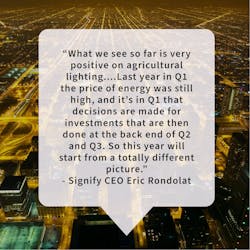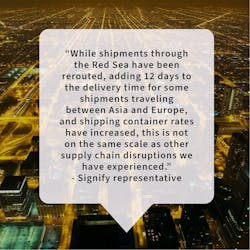Signify’s fourth quarter results echoed the third quarter as margins improved but sales and earnings declined amid difficulties in horticulture, indoor professional, consumer, OEM, and China. Some trouble spots including horticulture are now improving, but geopolitical turmoil prevents the company from forecasting overall sales, CEO Eric Rondolat said.
Nominal sales including the negative impact of currency fell 12.3% to €1.73 billion ($1.88 billion) from €1.98 billion in the same quarter a year ago, ending Dec. 31. The comparable sales decline — adjusting for currency and other factors — was 7.7%. Net income sagged 31.5% to €59 million ($64.1 million) from €86 million a year ago.
While the top and bottom line both dropped, Signify reported that gross margins improved to 40.8% from 37.1% from last year’s fourth quarter and that adjusted EBITA margins rose to 12.1% from 10.2%. It attributed the margin improvements to “effective COGS (cost of goods sold) management and positive sales mix.”
Ongoing cost cutting at Signify has included factory closures, a paring of the central organization, and a related restructuring. None of that has yet translated into actual profits, despite the margin improvements.
For the year, 2023 nominal sales fell 10.8% to €6.7 billion ($7.28 billion) from €7.51 billion, an 8.3% drop on a comparable basis. Net income tumbled 59.6% to €215 million ($233.6 million) from €532 million.
Adjusted EBITA margin for the year was 10%, just down from last year’s 10.1%. It has climbed over the last two quarters with the cost cutting, having previously been in decline to the point where the company in July lowered its 2023 EBITA forecast to between 9.5% and 10.5% from the previous 10.5% to 11.5% range.
“In Q4, our gross margin was again strong, confirming our improving operational performance,” Rondolat said. “This brought our adjusted EBITA margin into double digits for the full year. While we continued to face adverse market conditions in some geographies and in the consumer and OEM segments, we have gained share with our professional connected systems.”
Green shoots in horticulture
Rondolat told analysts on a web call this morning that outdoor professional lighting has performed well, but the market for indoor professional lighting continues to be weak. And while horticultural sales yet again fared poorly, the market seems to have now bottomed out.
“What we see so far is very positive on agricultural lighting,” Rondolat said when asked by one analyst about the outlook in that sector for 2024. “That’s starting from a low base, because last year in Q1 the price of energy was still high, and it’s in Q1 that decisions are made for investments that are then done at the back end of Q2 and Q3. So this year will start from a totally different picture. We see very good traction on agricultural lighting, and we are very well positioned because during the crisis, even if our revenues had gone down, we have continued to be present in front of the customers, and we have developed new offers.”
The Signify boss noted that the agricultural sector “started very strongly in January, and we expect this to continue for the full year.” That outlook marks a reversal compared to last July, when Rondolat said that 2023 would be a “season that is missed” for the company’s horticulture business.
Horticulture is part of Signify’s Digital Solutions division, which later this year will change its name to Professional as part of the previously announced restructuring (see link in third paragraph). Given the weakness in horticulture, indoor lighting, and in the OEM part of the group, Digital Solutions sales fell 7.5% nominally and 2.9% nominally for the quarter to €1.02 million ($1.11 million) from €1.11 million a year ago. Income from operations rose 13.3% to €79 million ($85.8) from €70 million a year ago.
The Digital Products division — soon to change its name to Consumer — took a 14.3% hit in nominal sales and 9.4% in comparable, declining to €566 million ($614.88 million) for the quarter from €661 million a year ago. The company is currently trying to re-energize sales of its signature Hue brand. Analysts have pointed out that that Hue is priced well above competitors’ offerings, but Signify has not yet indicated any price reductions.
Fluorescent ban hits Conventional
As expected, the Conventional division (non-LED) declined more than usual as Europe’s ban on fluorescent lighting hit hard. Sales plunged 33% on a nominal basis and 29.6% comparably to €136 million ($147.75 million) from €203 million, although income soared 374.2%, to €21 million ($22.8 million) from €4 million.
Signify’s restructuring includes moving OEM activities into their own new division, which should mitigate the negative effect that OEM has had on the other divisions, especially consumer. In a related move, Rondolat said that 1,000 jobs would go from the central organization as Signify gives more authority to its new divisions. LEDs Magazine will report more on today’s restructuring update, and on the company’s sustainability progress, in separate articles.
For the year, Digital Solutions sales fell to €3.94 billion ($4.28 billion) from €4.23 billion, down 6.9% nominally and 5.4% comparably. Income was up 11.2% to €285 million ($309.62) from €256 million. Digital Products sales fell to €2.12 billion ($2.3 billion) from €2.47 billion (14.2% on a nominal basis and 10.5% on a comparable basis) while income fell 28.3% to €56 million ($60.8 million) from €78 million. Conventional sales fell to €627 million ($681 million) from €793 million (20.9% on a nominal basis 18.4% on a comparable basis) as income edged up 2.8% to €62 million ($67.4) from €60 million.
Global volatility
In looking ahead through 2024, Rondolat forecast continued margin improvement “of up to 50 basis points” reflecting what he said would be “the first benefits of the restructuring program.” He also told one analyst on the call that Signify has “a very robust plan for a reduction in the bill of material.”
But he refrained from forecasting sales when pressed by the analyst for more details.
“It’s difficult to make any type of forecast at this point in time,” Rondolat said, pointing to ongoing difficulties in the Chinese market and in consumer and indoor professional. “We also see a market with a high level of volatility. That’s the reason why we’re not specifically guiding on sales. We are cautious for 2024…There are a lot of geopolitical tensions that are not being solved at this point in time. We don’t know if they will eventually be solved in 2024.”
Rondolat also noted that elections across Asia, Europe, and the U.S. could slow down markets.
LEDs asked Signify to describe the effect that Red Sea shipping diversions have had on business.
“While shipments through the Red Sea have been rerouted, adding 12 days to the delivery time for some shipments traveling between Asia and Europe, and shipping container rates have increased, this is not on the same scale as other supply chain disruptions we have experienced,” a spokesperson replied. “We do not anticipate a material impact on working capital at this time although we will continue to monitor the situation.”
MARK HALPER is a contributing editor for LEDs Magazine, and an energy, technology, and business journalist ([email protected]).
Follow our LinkedIn page for our latest news updates, contributed articles, and commentary, and our Facebook page for events announcements and more. You can also find us on the X platform.







